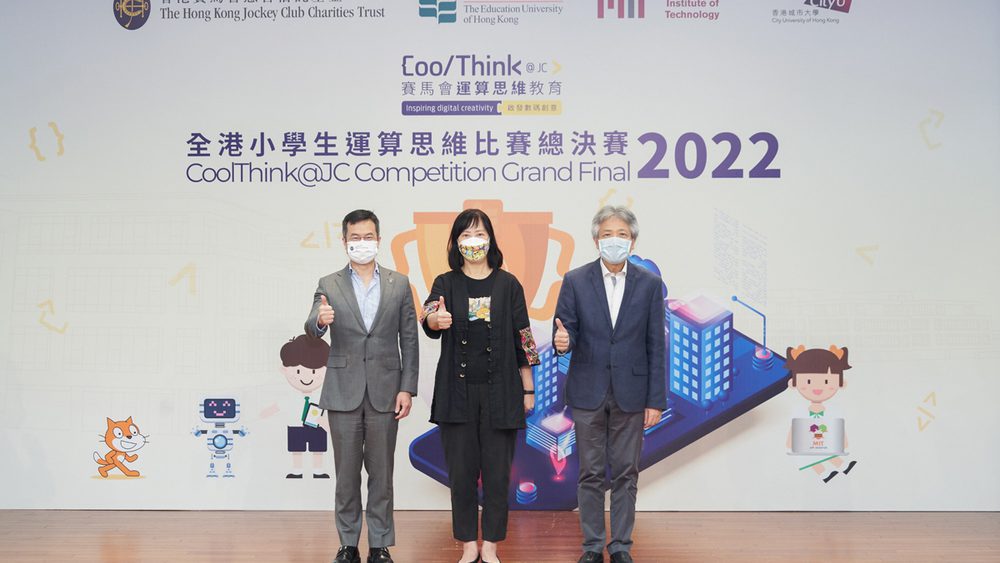Created and funded by The Hong Kong Jockey Club Charities Trust, and co-created by the Education University of Hong Kong, Massachusetts Institute of Technology and City University of Hong Kong, CoolThink@JC organized its 6th annual competition on computational thinking for primary students, attracting 300 teams from 136 schools this year – the highest participation number ever.
In looking for how participants apply their knowledge and skills on computational thinking to their projects, the judges were impressed not only with their creative masterpieces and excellent presentation skills, but also their dedication, clever conceptual thinking, programming prowess, problem-solving skills and teamwork.
Ms Michelle Li Mei-Sheung, Permanent Secretary for Education, underscores the Education Bureau’s commitment to nurturing innovation and technology talents to support the future development of Hong Kong. “We are delighted to see our teachers’ active participation in coding education courses to help enhance students’ computational thinking and digital literacy,” she says. “We hope that teachers could continue pursuing excellence in teaching and contribute to nurturing diverse innovation and technology talents.”
Mr Leong Cheung, then-Executive Director of Charities and Community at The Hong Kong Jockey Club, notes that with the launch of the CoolThink@JC Programme, more teachers and students have mastered computational thinking and are able to put what they have learned into practice. Participants created numerous devices that improve people’s quality of life, help fight against COVID-19, and more importantly, bring hope and positive energy to the community.
Safe sterilizer
Fung Kai Innovative School is the Champion in the App Inventor category. Their inspiration came from their observation of hygiene protection at school during the pandemic. They identified door handles as a major infection hazard, and came up with an intelligent device that performs two main technology-based functions.
The first function is ‘automatic sanitization’ at regular intervals by means of Bluetooth connectivity, while the second function is ‘timely sanitization’ by means of an infrared detector which activates sanitization when the distance between the hand and the door handle is less than 32.6 cm. As the hand leaves the handle, it is immediately sanitized for three seconds. The device can also generate a ‘disinfectant spray counts’ record of the total number of regular and timely sanitizations for reference and planning purposes.
Brighten Your Mood App
Po Leung Kuk Luk Hing Too Primary School is the App Inventor category’s First Runner-Up. “We hope the app helps primary school students and youngsters understand their feelings and personalities, which in turn help them set future goals. Our ultimate goal is to assist students to understand and apply the philosophies of positive education,” the team explains.
The app consists of four main components, including 24 ‘Positive mini missions’, unlocking ‘achievement trophies’ and ‘virtual pets’, interactions with pets and ‘Daily positivity reminder cards’.
Through this interesting game, the team hopes to help students gain confidence and a positive mindset to face upcoming obstacles.
The virtual pets they designed can accompany users and understand their feelings. Users can simply click the ‘mood button’ to start interaction with virtual pets for simple counseling and advice on handling emotional issues.
“We apply AI speech recognition technology on virtual pets to facilitate interactive conversation. Keywords of the conversation are analyzed to grasp users’ needs and moods in order to generate responses,” the team elaborates.
The accent on food
Marymount Primary School’s CARS team, the Second Runner-Up Awardee in the App Inventor category, designed the ‘CARS Traffic light’ four-part series that helps users understand their eating habits. The program is especially suitable for children who are going through puberty, as it helps reduce health problems induced by imbalanced diets.
Marymount Primary School’s MEJI team, the Merit Awardee in the App Inventor category, designed ‘Ex-Expired’ which notifies and reminds users of near-expired food days prior to the expiry date and recommends diversified recipes.
Focus on the body
TWGHs Tang Shiu Kin Primary School, the Champion in the Scratch category, designed ‘Muscle-training for Body and Mind’, a sensory sport and exercise game that allows students to maintain a healthy body and explore the fun in learning.
King’s College Old Boys’ Association Primary School No. 2, the First Runner-Up in the Scratch category, designed an interactive game that tests the flexibility of the user’s limbs and joints. The program records the exercise data for physiotherapists to conduct further analysis.
Integrating programming
Professor Stephen Cheung Yan-Leung, President of the Education University of Hong Kong and chairman of the competition’s grand final judging panel, is very pleased with the quality of the entries. He notes: “This year, the themes of the works are more diverse than ever before with the combination of different STEM and artificial intelligence elements.”
He urges schools to continue to integrate coding into the teaching of different subjects so that students can integrate their knowledge and skills.
Read More Online: https://www.thestandard.com.hk/section-news/section/2/244406/Creativity-shines-in-the-CoolThink@JC-Competition-2022




Comments are closed.